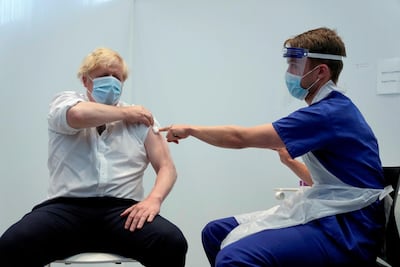The UK could delay its reopening scheduled for June 21 if the Indian variant of the coronavirus there continues to drive a surge in cases.
Health Secretary Matt Hancock said on Sunday the government was "absolutely open" to departing from its road map out of lockdown as the strain, known as the Delta variant, had caused a "very significant" surge in case numbers.
Mr Hancock said vaccines had weakened but not broken the link between infection, hospital admissions and death.
"It's too early to make a final decision on that,” he told Sky News.
"The prime minister and I and the team will be looking at all the data over this week. We've said that we'll give people enough time ahead of the June 21 date.
"We are not saying 'No' to June 21 at this point.”
The UK reported a rise in coronavirus cases, with daily infections nearing 6,000 a day. Hospital admissions and deaths remained flat.
Removing the last batch of restrictions on June 21 – referred to as "freedom day" by the British media – would mean the reopening of nightclubs, full sports stadiums, people queuing for drinks in bars, large weddings and the resumption of conferences.
The remaining social distancing restrictions - such as mask-wearing and the one-metre rule - are also scheduled to end.
Mr Hancock said the latest advice the government had received was that the Indian variant is 40 per cent more infectious than the previously dominant UK strain.
"That means that it is more difficult to manage this virus with the new Delta variant," he said.
"Ultimately, it does make the calculation more difficult for June 21, but it doesn't change our strategy, which is we all need to go and get vaccinated and that way we will break this link between the number of cases and the number of hospitalisations.
“The majority of people going into hospital right now are unvaccinated.”
Epidemiologist Prof Anne Johnson, from University College London, said a “significant uptick” in the number of cases meant next week would be critical for deciding whether to delay reopening the UK.
"What we need to understand is what the risks are of that setting off another wave of infection, and also how well we can do in controlling it,” she said.
Meanwhile, Mr Hancock confirmed that the UK will offer coronavirus vaccines to those aged under 30 from next week.
Currently, only over-30s and vulnerable people are eligible for injections under Britain’s priority vaccination schedule.
Children could be offered vaccines from as early as August under plans being considered by the government, The Telegraph reported.
The UK medicines regulator has given its approval for children aged 12 to 15 to receive the vaccine made by Pfizer.
However, the Joint Committee on Vaccination and Immunisation still has to advise the government on whether to extend the programme.
While children are less likely to succumb to serious illness from coronavirus, they can still spread the disease to more vulnerable people.
Real-world studies in England showed that a single dose of a vaccine can reduce the danger of transmission by as much as half.


